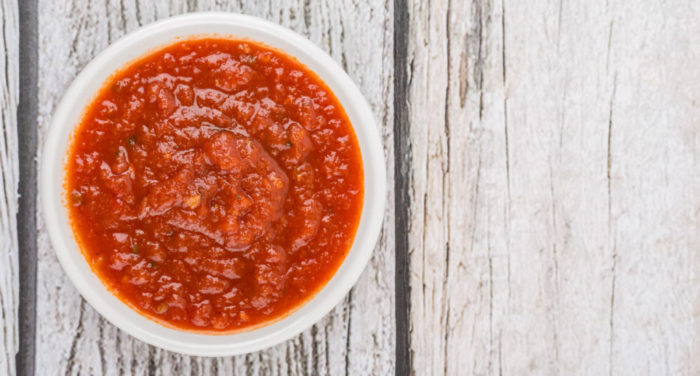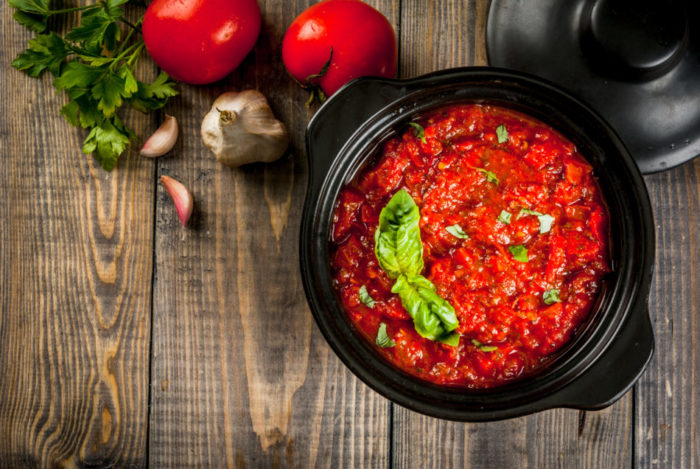Marinara sauce and spaghetti sauce are two very common condiments for flavoring food. These are both characterized as pasta sauces and are incredibly similar. More often than not, one might have trouble telling them apart. However, there are differences in marinara vs spaghetti sauce, once you scratch beyond the surface.
What makes them so similar is that both these sauces are based on tomato sauce. It’s the key ingredient here and lays the foundation for both these sauces. Other ingredients are added to the tomato sauce base and create these two very delicious sauces.
Let’s take a closer look at them and see where it leads us.
Marinara vs Spaghetti Sauce: The Key Points For These Sauces
The Difference Between Marinara And Spaghetti Sauce
Since we are looking at a comparison, let’s see where these sauces differ. Both of them have a tomato sauce base and have fabulous flavors added to the mix.
- Marinara is a relatively simple sauce. It uses fewer ingredients and is relatively quick to whip up. Spaghetti sauce is more complex and often requires more ingredients, time, and complexity for its preparation.
- Spaghetti sauce almost always contains meat. The kind of meat will depend on the variation and its recipe, but it’s very likely to be present. Marinara sauce generally doesn’t include meat.
- Because of the presence of meat and other ingredients, spaghetti sauce usually has a thicker texture when compared to marinara sauce.
- Marinara is often used as a dipping sauce. Spaghetti sauce isn’t used the same way.
These form the key elements of the differences between these pasta sauces. However, the list cannot be exhaustive because of the nature of these recipes.
As an example, the preparation of marinara sauce starts with tomato sauce to which ingredients are added. Spaghetti sauce often starts with sauteing garlic and onions with some meat.
Additionally, both these sauces don’t have a fixed recipe. So, variations can happen depending on the preference of the cook, or between various regions.
What Is Pasta Sauce?
As we know, marinara and spaghetti sauce are both variants of pasta sauce. So, how do marinara and spaghetti sauce do vs pasta sauce?
Pasta sauce is an umbrella term, or a generic term, used to represent a variety of sauces used with pasta. This could be as simple as tomato sauce, or include more complex variations like marinara sauce and spaghetti sauce.
But the number doesn’t just stop here. Common pasta sauces are:
- Marinara sauce
- Spaghetti sauce
- Tomato sauce
- Amatriciana Pasta Sauce
- Alfredo Pasta Sauce
- Pomodoro Pasta Sauce
- Bean Bolognese
And many more.
What Is Spaghetti Sauce?

Spaghetti is a type of pasta, so spaghetti sauce is a pasta sauce. Just like pasta sauce is an umbrella term, spaghetti sauce too represents a few sauces. There’s no one exact recipe for spaghetti sauce, though there are a few common ones.
Technically, even marinara sauce can be considered a spaghetti sauce! It does go pretty well with spaghetti, right? Spaghetti is versatile enough to work with a variety of sauce bases. Pair it with tomato-based, cream-based, or other sauces, and you’ll find it works exceptionally well.
The versatility of spaghetti and the wider definition of spaghetti sauce aside, its basics can be pretty conventional. When we imagine a spaghetti sauce, it’s usually a red, tomato-based sauce with some meat.
While it’s not necessary for a spaghetti sauce to be tomato-based, they are the most popular. And for good reason! It’s a delicious time-tested combo that works wonderfully.
What Is Marinara Sauce?

Marinara sauce is a rather well-known pasta sauce. This is a tomato-based sauce with added herbs that bring flavor and magic. Conventionally, these herbs and spices go on top of the tomato sauce.
These include, but are not limited to, garlic, onions, spices, olives, capers, wine, and a lot more. The choice of spices varies by the cooking process and the desirable taste and recipe.
American-style marinara sauce is slightly different from its Italian cousin. This sauce doesn’t include meat, but is thicker than the original Italian marinara sauce. The American variant might have more herbs and spices for a sharper and interesting flavor.
Globally, it’s the American-style marinara sauce that is more popular, though the original marinara sauce still holds sway in Italy.
FAQ And More On These Sauces
Can You Make Marinara Sauce From Scratch?
It’s easy to make marinara sauce from scratch. There are plenty of simple recipes to get the job done. You can look for more complex recipes if you know your way around the ingredients.
Here’s a quick and simple recipe you can try. For this recipe, you’ll need:
- Canned tomatoes – One, whole peeled.
- Garlic cloves – Two.
- Onion – 1, medium.
- Extra-virgin olive oil – 2 tablespoons.
- Salt, to taste.
- Red pepper flakes, to taste.
Put all the ingredients in a saucepan and put it on medium-high heat. You can add salt at this point, or wait for later until the sauce has a better consistency.
Once the mix comes to a boil, lower the heat to low and let it simmer for about 45 minutes to an hour. You might need to stir the mix occasionally, though it doesn’t need a constant watch. Once this time is done, remove the saucepan from heat and fish out the onion from the mix.
Next, use a wooden spatula to crush and chunks of tomato still left. The same goes for any garlic cloves as well. Once you’re satisfied with the consistency, you can consider adding salt (if you didn’t add it already).
At this point, the marinara sauce is ready. If you’d still like the texture to be smoother, put the sauce in a blender. This will remove any remaining chunks and give the sauce a smoother consistency.
Is It Okay To Use Marinara Sauce On Pizza?
Marinara sauce works wonders on pizza. Technically, marinara sauce and pizza sauce are pretty much the same thing. There is a slight change in flavors, but it’s easily compensated for while making the pizza. In fact, even if you don’t make any changes, it would be tough to point out when pizza sauce has been substituted by marinara sauce.
How Long Does Marinara Sauce Last In The Fridge?
When placed inside a refrigerator in airtight, fridge-safe containers, the marinara sauce will be good for about 5-7 days. If you want it to last longer, it’s better to freeze it after placing the sauce in a freezer-safe container. This extends the shelf-life to 2-3 months. Of course, once it is in the freezer, it’s not meant for regular use. Once you get it out of the freezer, use the sauce within 3-5 days.
How Long Does Pasta Sauce Last In The Fridge?
As we know, there are several types of pasta sauce, so it’s not entirely possible to predict how long they’ll last in a refrigerator. However, as a general rule, we can assume that it will stay good for 3-5 days, assuming it’s placed in a refrigerator-safe and airtight container.
How To Thicken Pasta Sauce?
If you’re making your own pasta sauce, a good way to thicken it is to let it simmer for longer. This will reduce the contents and make it thicker. However, this may not always be an option, in which case you can try thickeners.
Using corn starch is a popular way to go about this. Remember to mix the starch in cold water before you add it to the sauce. Other popular thickening options include potato starch, potato flour, potato flakes (mashed potatoes), and other starches.
Some people prefer using heavy cream or tomato paste as a way to thicken the sauce. Keep in mind, using starch will have minimal to no effect on the overall flavor of the sauce. However, adding ingredients like tomato paste and heavy cream will impact the taste. The desirability of either option depends on your personal taste or the recipe!
The Bottom Line
As we notice in this marinara vs spaghetti sauce discussion, these sauces can be remarkably similar, yet very different. Marinara sauce is usually the simpler one, though that doesn’t mean it lacks in flavor. It’s incredibly versatile and adds flavor to many recipes.
Spaghetti sauce is usually thicker, and can represent a variety of sauces working with different bases. Generally speaking, a spaghetti sauce will contain meat while marinara sauce usually does not.
Additionally, marinara sauce is essentially tomato-based. While the most popular variant of spaghetti sauce is tomato-based, it isn’t necessarily the case for all spaghetti sauces.